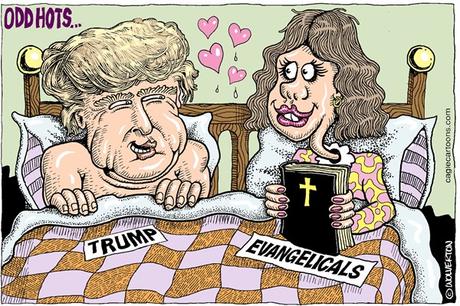 (cartoon image is by Monte Wolverton at cagle.com.)
(cartoon image is by Monte Wolverton at cagle.com.)If you're like me, then you're amazed at how christian evangelicals can support a pedophile like Roy Moore or someone like Donald Trump (who has no values beyond self-love). These people claim to be "values voters", but the values they support don't come from religion (but from their politics).
Stuart Rothenberg tries to explain this phenomena. Here is part of his article:
Nobody should be surprised that evangelical voters are sticking with the GOP. I’ve been watching evangelical voting behavior since I worked for Paul Weyrich’s Free Congress Foundation in the 1980s, and I’ve come to believe that, in most cases (though certainly not all), white evangelicals get their religion from their politics, not their politics from their religion. That is, many evangelicals are first and foremost political conservatives drawn to a church (or a pastor) that confirms their worldviews and, in turn, their political views. They gravitate to evangelical, fundamentalist and Pentecostal churches that are spread across the American landscape, particularly in rural and small-town America, because those churches hold views about the Bible and human behavior that are traditional rather than pragmatic. Not surprisingly, most of those church members are politically conservative, particularly on social/cultural issues but increasingly also on the role of government. . . . For many white evangelicals, their religious and political views are so strongly intertwined that it is almost impossible to separate them. When their views of religion and morality collide with politics, politics often wins out. That’s why it’s naïve to ask why so many white evangelicals continue to support Donald Trump or Roy Moore. Remember physician Scott DesJarlais (R-TN 4), the pro-life, tea party conservative first elected to Congress in 2010? DesJarlais admitted pressuring his mistress to have an abortion and acknowledged he had multiple sexual relationships with patients and co-workers. His wife had two abortions. And yet, the Family Research Council, which promotes “traditional marriage and family and advocates for policies that uphold Judeo-Christian values” (according to the Almanac of American Politics, 2016), gave the congressman a 100% rating for 2014. Even more amazing, voters re-elected the Republican in 2012, 2014 and 2016. The congressman’s hypocrisy is obvious, but no more so than the political behavior of his conservative, evangelical supporters. If you have any doubt that white evangelicals are as much a political category as a religious one, you need only look at recent elections and exit polls. In 2016, Donald Trump received the support of 80% of white evangelicals and born-again Christians, while Hillary Clinton drew just 16%. Clinton, on the other hand, won 60% of non-evangelicals. One year later, in the Virginia governor’s race. Republican Ed Gillespie carried 79% of white evangelicals, compared to Democrat Ralph Northam’s 19%. Northam carried a stunning 67% of Virginians who were not white evangelicals or born-agains. Obviously, I have painted with a broad brush here. Religious institutions are changing all the time – witness Pope Francis’s priorities and comments. And the increasing partisan polarization we have witnessed surely is impacting how people evaluate the behavior and beliefs of others. What does all of this mean for Roy Moore’s Senate race next month? Given their politics, I expect the overwhelming percentage of white evangelicals in Alabama to vote for Moore, so his prospects depend on turnout by establishment Republicans, Democratic voting groups and Republican women. If Moore does win – and he is more likely than not to defeat Democrat Doug Jones – it will be because white evangelicals find his politics more important than his morality.

